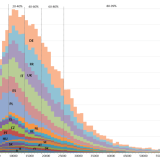EU context
Il pilastro europeo dei diritti sociali stabilisce gli impegni dell’UE in materia di retribuzione: il diritto dei lavoratori a salari equi che garantiscano un tenore di vita decoroso; la garanzia di un salario minimo adeguato; la prevenzione della povertà lavorativa.
Il lavoro di Eurofound
Eurofound riferisce regolarmente su diversi aspetti della retribuzione e del reddito alla luce delle mutevoli circostanze economiche in tutta Europa.
Monitoraggio delle retribuzioni
Attraverso il suo Osservatorio europeo della vita professionale (EurWORK), Eurofound riunisce una serie di informazioni sulla retribuzione. La regolarità delle relazioni consente di produrre una serie più lunga di osservazioni sulla retribuzione contrattuale, in modo che le tendenze possano essere monitorate. Eurofound pubblica regolarmente aggiornamenti di attualità sui salari minimi previsti dalla legge e la retribuzione disciplinata da contratto collettivo. Inoltre, monitora gli sviluppi a livello nazionale in relazione a meccanismi di definizione dei salari, retribuzione equa, variabile e bassa nonché divario retributivo di genere.
I profili dei paesi per vita professionale contengono informazioni sulla retribuzione a livello nazionale e sono regolarmente aggiornati. EurWORK gestisce due banche dati in materia di retribuzione (v. risorse sotto).
L’Osservatorio delle professioni in Europa (EJM) di Eurofound valuta i cambiamenti a livello di occupazione per posto di lavoro in base a varie misure qualitative, compresa la retribuzione. In particolare, contribuisce alla conoscenza del fenomeno della polarizzazione dell’occupazione, cioè la misura in cui la crescita dell’occupazione è probabilmente maggiore nella parte superiore e inferiore della distribuzione salariale rispetto al centro.
Dati dell’indagine
Le indagini di Eurofound monitorano anche le condizioni salariali nell’UE. La retribuzione è un elemento fondamentale nella ricerca di Eurofound finalizzata alla valutazione della qualità del lavoro. Nell’indagine europea sulle condizioni di lavoro (EWCS), il reddito è uno dei sette indicatori di qualità del lavoro. L’EWCS riferisce anche sul divario retributivo di genere (maggiori informazioni sono disponibili nello strumento di visualizzazione interattiva dei dati EWCS).
L’indagine sulla qualità della vita in Europa (EQLS) monitora l’impatto del reddito sugli standard di vita e la maniera in cui la disuguaglianza di reddito è correlata alla coesione sociale e al benessere, Analizza in che modo la crisi ha colpito le famiglie soffermandosi sulle famiglie a basso reddito, il debito a livello di nucleo familiare e le categorie a rischio di povertà. L’EQLS raccoglie anche informazioni sul reddito pensionistico e sulle opzioni per prolungare la vita lavorativa (maggiori informazioni sono disponibili nello strumento di visualizzazione interattiva dei dati EQLS).
L’indagine sulle imprese europee (ECS) rileva il ricorso a sistemi di retribuzione variabile nelle aziende e l’applicazione di accordi salariali collettivi ai dipendenti in tale contesto. L’indagine consente di correlare le informazioni sulla retribuzione variabile e la contrattazione salariale alle informazioni sull’organizzazione del lavoro, la gestione delle risorse umane, la partecipazione diretta dei dipendenti e il dialogo sociale, nonché con le prestazioni e il benessere sul luogo di lavoro.





























